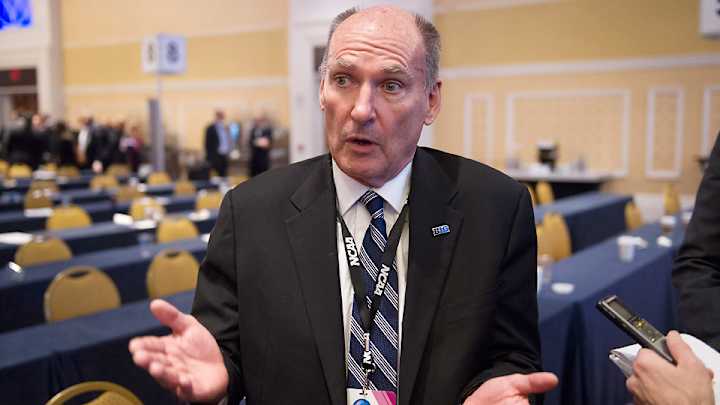Big Ten's Delany: 'Year of Readiness' only meant to spark conversation

ROSEMONT, Ill. — Big Ten commissioner Jim Delany described the current college athletic landscape as a “time of change and tumult, also a time of opportunity” at the conclusion of the Big Ten Joint Meetings on Wednesday.
The three-day summit included meetings with conference and high school athletic directors and discussions on issues such as the 20-hour practice limit rule, freshman ineligibility and the college athlete experience.
Everett Golson's move to Florida State shows value of graduate transfer rule
Delany met with the media to discuss the balance between education and sports for Big Ten athletes. The commissioner stirred the college sports landscape in February when he expressed an interest in bringing back freshman ineligibility for football and men’s basketball players.
Delany insisted Wednesday his thoughts on the issue were far from a formal proposal. Instead, he wanted to create a dialogue.
“My desired end result is to stimulate a conversation about the primacy of academics. I’m not naïve about any proposal,” Delany said. “I have no other motive other than to raise the issue of education. If we wanted to make a proposal, we would’ve made a proposal. We’re trying to bring about a focused discussion on education and these two sports.”
According to Delany, the so-called “Year of Readiness” may never be an official policy, but he hopes it can be included amidst a “broad set of national discussions.”
The commissioner extended his educational concerns to the NCAA’s 20-hour practice limit rule for in-season athletes. Echoing the sentiment of Wisconsin athletic director Barry Alvarez, Delany agreed the 20-hours-per-week time limit was not realistic in practice.
“There is not a cookie cutter answer, the 20-hour rule is a misnomer,” said Delany, who mentioned research showed Division I athletes could spend over 40 hours per week involved in their sport. “It’s such a misnomer it needs a new label. [The rule] is obviously at odds with what’s actually occurring. It works for some students and teams but not for others.”
Delany stopped short of offering an idea on how to permanently change the 20-hour rule, citing complexities in applying one solution to all sports. He did suggest breaking up the 12-month cycle into three parts and said he wants athletes to have time for internships or even study abroad programs.
*****
Surrounded by hype, Jim Harbaugh motivated by reality at Michigan
The Big Ten college athlete experience was challenged directly at one member school earlier this month when former Illinois offensive lineman Simon Cvijanovic accused head coach Tim Beckman of creating culture of “misuse and abuse” in the Fighting Illini football program. Families of three Illinois women’s basketball players also accused head coach Matt Bollant and associate coach Mike Divilbiss of verbal and racial abuse.
Delany indicated he will let the school handle investigating the allegations.
“I’ve just read some news reports,” Delany said of his knowledge of the situation. “[Illinois will] take a good, hard look, a fair look. There should be no rush to judgment. They’ve always taken an honest look at situations.”
